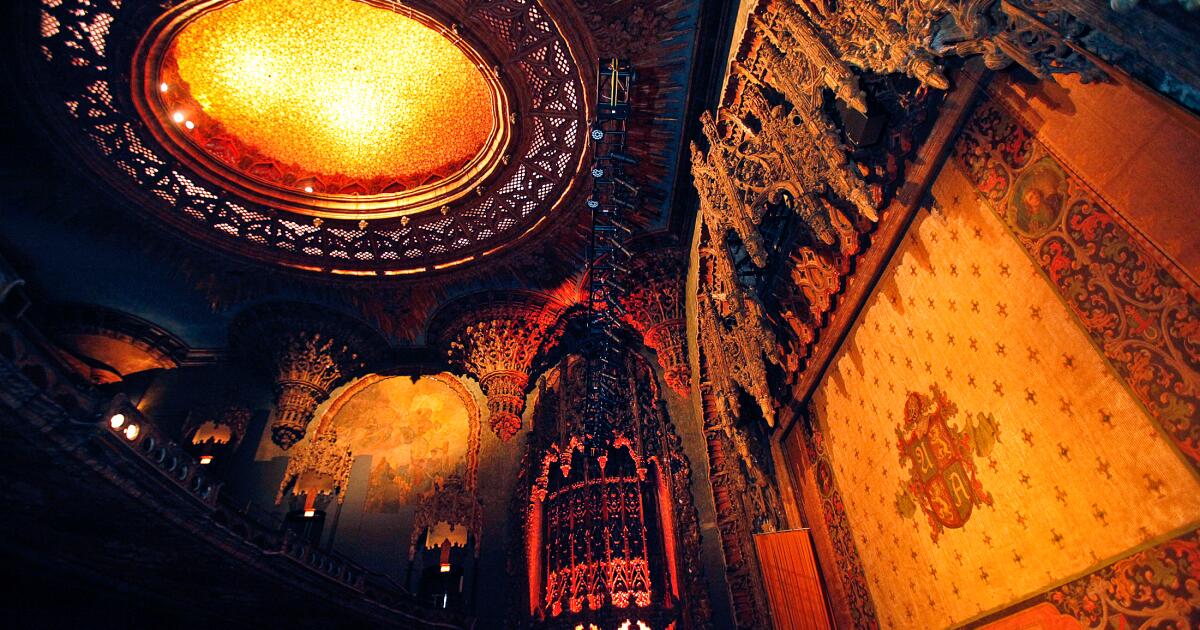
The former Ace Hotel in downtown Los Angeles, which helped lead an economic revival on a historic stretch of Broadway a decade ago, has reopened as a minimal-service operation akin to Airbnb, following a strategy that has become increasingly common for struggling hotels in recent years.
Now called Stile Downtown Los Angeles by Kasa, the 1920s-vintage hotel tower has resumed limited operations after shutting down nearly six months ago. Downtown hotels were particularly hard-hit by the pandemic, and some have changed owners or operators.
Ace Hotel Group had operated the 182-room hotel near Broadway and Olympic Boulevard since it opened in 2014, even as its ownership changed twice over the years. The chic brand made the Ace a destination for travelers as well as local residents who patronized its buzzy rooftop bar and restaurants.
South Korea-based AJU Continuum, which bought the hotel in 2019, announced last week that it had brought in Kasa Living Inc. to operate the property.
Kasa, which is based in San Francisco and has a national presence, “offers the consistency of a major hotel chain with the convenience and character of a modern short-term rental,” AJU Continuum said in a statement.
Ace Hotel said upon its departure that the Broadway hotel would be operated in the future as “a limited-service, rooms-only operation, managed via a tech platform.”
The limited-service model under which guests typically receive codes to get into their rooms via their phones is “basically an Airbnb on steroids,” said Donald Wise, a hotel investment banker at Turnbull Capital Group. “You’re not going to someone’s house or a condo, but to a box that has no more or less service than an Airbnb would have.”
The independent United Theater on Broadway, which is connected to the hotel, will continue to operate as an open venue hosting concerts, performances and special events, AJU Continuum said. The hotel will have a rooftop wine bar but no restaurants.
The site has had multiple identities since it was built in 1927. Constructed with backing from film luminaries Mary Pickford, Douglas Fairbanks, Charlie Chaplin and D.W. Griffith, it originally was meant in part to provide a theater for the United Artists movie production company they founded.
The Spanish Gothic theater was designed by C. Howard Crane and the tower by Walker & Eisen, the team behind other local landmarks including the Fine Arts Building downtown and the Beverly Wilshire hotel in Beverly Hills. It held offices for rent and a theater where United Artists pictures premiered, starting with Pickford’s film “My Best Girl.”
Other prominent occupants of the property through the years include California Petroleum Corp., Texaco and flamboyant preacher Gene Scott, whose broadcasts were heard nationally. He died in 2005.
The opening of the Ace in 2014 was a pivotal point in the residential renaissance of downtown that helped spur growth nearby, said Nick Griffin, executive vice president of DTLA Alliance, formerly the Downtown Center Business Improvement District.
“It was evocative of that particular moment in downtown, arriving as a kind of a hipster paradise,” he said. “That area of Ninth and Broadway was a particularly hip area with fashion and hotels at the intersection of the Historic Core, the fashion district and the downtown center.”
Two other boutique hotels created in historic buildings followed the Ace to the neighborhood: the Hoxton Downtown LA and Downtown L.A. Proper. Both are also on Broadway.
Short-term rentals in former traditional hotels and apartment buildings have been popping up downtown as business owners work to find financial equilibrium, Griffin said.
“The new model of short-term rentals is sort of indicative of this moment in downtown as we continue to evolve and innovate coming out of the pandemic.”
Griffin’s improvement district reported that average downtown hotel occupancy, which plunged during the pandemic, has reached nearly 69%, up a percentage point from a year ago. That’s close to what is usually considered a healthy rate but down from late 2019 when occupancy was closer to 80% and average room rates were higher.
“The downtown Los Angeles market is still lagging, hasn’t recovered fully to the numbers that were pre-COVID,” said consultant Alan Reay of Atlas Hospitality Group. “We are definitely starting to see more distress among owners.”
Challenges for hotel owners include a reduction in business travelers to downtown offices as more people work from home. They also face high interest rates on their loans and rising labor costs.
Limited service hotels such as Stile may produce more profit for their owners while also lowering rates for guests who don’t mind having fewer services, Reay said.
